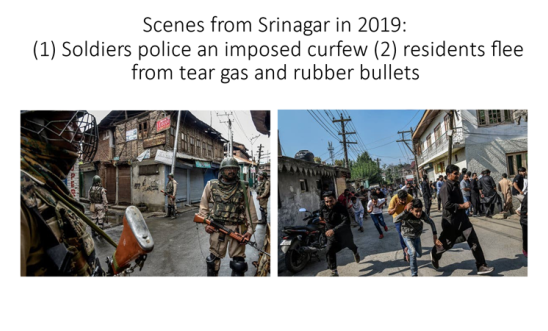
Realities of Life in Kashmir

Blog by Cherry Bird, Bisma and SJ Ali
Most people know very little about “Kashmir”. At best, they may associate the region with a long-standing India vs Pakistan conflict way up in the snowy Himalayan mountains around the “Line of Control” that separates the areas administered by the two powers. Of the total population of around 15 million, the majority, about 12.5 million, lives in the Jammu and Kashmir Valley plus Ladakh, administered by India, and the remainder in Azad Kashmir and Gilgit/ Baltistan, administered by Pakistan.
But there is much more to know about this complex region. Scenically rugged and beautiful, J&K is particularly rich in natural resources and cultural history, a place where tourists from within South Asia and across the globe have traditionally visited, though numbers are now much reduced and safe areas limited. Exploitation of the natural resources, including water sources as well as timber and minerals, are also a reason why control of these areas is so desirable.
But currently J&K is a place where the population is subject to significant human rights violations and daily life is fraught with risk. Where curfews, arbitrary arrests and extra-judiciary killings are frequently reported. Where ordinary people, farmers and office workers, struggle to feed their families and keep them safe. Where journalists dare not express an opinion that is contrary to, or in any way critical of, government policy. Where peaceful protests are put down by armed forces, often violently, and even a social media post can land you in jail. The Office of the High Commissioner on Human Rights and various human rights organisations, including Amnesty International, have called out the systemic oppression of Kashmiris and appealed for transparent investigation of the violations and reparations.
The recent intensification of repression in J&K is a cause for serious concern. In 2019 the Indian government changed its status from India’s only Muslim majority state with its own parliament and Chief Minister and the power to make its own domestic policies, to a Union Territory governed directly from Delhi. This change is hugely contentious, took place without consultation and has created anxiety and insecurity amongst the Kashmiri population, as already they see their position undermined by incoming Indian businesses and money. Any attempt to express this, however mild, is met with instant and severe response from the authorities, who utilise sophisticated surveillance technologies to detect and respond to communications they consider in critical of the Indian government. Anyone found to be expressing contrary views, or even spreading information about protests, is labelled a terrorist.
A small but significant incident illustrates the level of surveillance ordinary people are subjected to and the impact it has on their daily lives and those of their families. Javid Ahmad Dar, an unmarried young man in his mid-30s, recently returned to Kashmir to renew his passport, having lived and worked for ten years in Saudi Arabia. His modest job in a coffee shop earned just about enough to provide for his family of seven.
However, in January 2022 Javid’s brother, Sajad Gul, a known Kashmiri Journalist, was booked under the Public Security Act for a viral Twitter video of a protest in the Hajin area of Sonawari. As a consequence of his brother’s record, Javad’s passport renewal was rejected by the Indian authorities. Javid’s ability to provide for his family has therefore been taken away, as he cannot go abroad and has not been able to get a job in Kashmir. His marriage prospects have been affected as his circumstances mean he has no financial security to offer and other families are reluctant to become involved lest they too suffer consequences. He also has to spend time and resources attending court to support his brother’s case. Meanwhile his family are struggling to get by.
The right to freedom of speech and association is something we take for granted in the West. It underpins all other rights and freedoms. In J&K, the combination of sophisticated communication surveillance technologies with harsh and speedy response to any perceived infringement has led to a culture of fear and disempowerment. We must support the people of J&K by spreading awareness of these human rights violations and calling for accountability of the Indian government.
Our blogs are written by Amnesty International staff, volunteers and other interested individuals, to encourage debate around human rights issues. They do not necessarily represent the views of Amnesty International.
0 comments